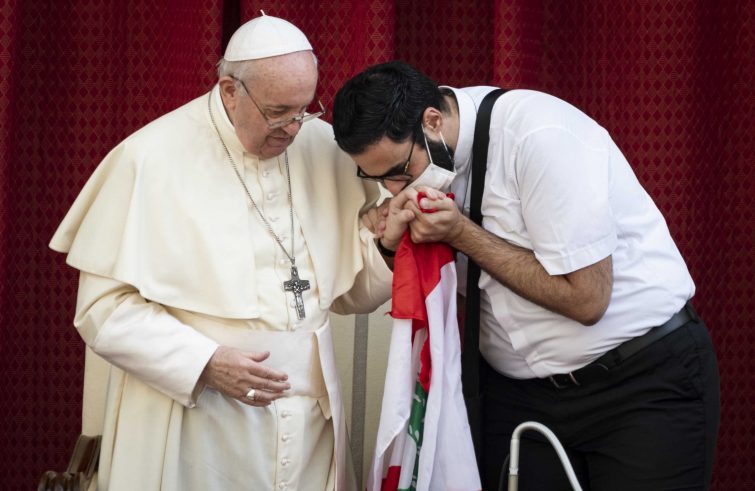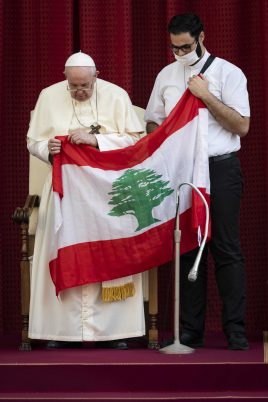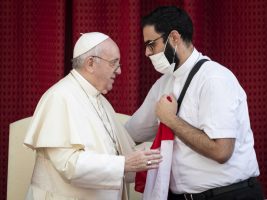
Father Georges Breidy‘s phone rings continuously. Most people are calling from Lebanon and other Middle Eastern countries. There is a reason for this: last Wednesday, the Lebanese Maronite priest was called by Pope Francis to stand alongside him at the end of the general audience, to pray together for the country of the Cedars, severely hit by a political, social and economic crisis and, lastly, the two explosions in the port of Beirut. The priest has been living in Rome, Italy, for the past four years, studying Spiritual Theology at the Pontifical Gregorian University. He also serves as the director of Radio Mariam for Middle Eastern countries. He described his experience to SIR: “I heard that the first Papal audience with the physical presence of the faithful since the outbreak of the epidemic would be held on Wednesday. I was keen to attend and I decided to bring the Lebanese flag with me, since the Pope has made frequent reference to our country after the explosions in Beirut. I thought that maybe, seeing the Lebanese flag, the Pope would impart a blessing to Lebanon even from afar. Or a brief greeting. I had not thought of anything else. When the Holy Father arrived in the courtyard, he did not greet anyone owing to anti-Coronavirus measures. But when he saw the flag he came up to me, took it and kissed it. A very meaningful gesture, as noted also my many Muslim friends.”
How did you come to stand at the side of Pope Francis?
During the audience the Holy Father asked a bishop to look for me. He found me and told me that at the end of the audience the Pope would say a few words about Lebanon. I didn’t know that he would make an appeal. I was told that the Pope wanted me to approach him with the flag. As I walked over to him, I had mixed feelings: joy, fear, responsibility, gratitude. Then, when I was told to stand beside him, I knelt down in front of Pope Francis, who asked me to stand up, but I answered that faced with such great and authentic generosity I could only kneel down to him. He then delivered his message and prayed with the faithful gathered in silence. At the end, I told the Pope that living in Lebanon is no longer possible and he asked me if I wanted to say a word of thankfulness. I did so spontaneously, from the heart. Since the Holy Father called on world faithful not to forget Lebanon, I felt the need to recall the problem of the emigration of Christians, of a large number of people who submitted documentation to leave the country, amounting to more than 350,000 people.
What are the consequences of these migrations for Christians?
Today Christians account for 30 % of the total population of Lebanon. Maronites account for 20 to 25%. We have become a minority. However, there are large numbers of Maronites throughout the world, in Latin America, Australia, Canada. These large-scale emigrations are caused by continuous wars in the country, one every fifteen years. We cannot live in these conditions. Living there has no longer a meaning. We are a welcoming people, but the crisis of Syrian refugees into Lebanon further impacted on us.
There are no longer the conditions for families and young people to live in the country today. Following the economic crisis, that broke out last year, people no longer have a future in Lebanon. People can no longer lead a dignified life owing to widespread corruption.
Can you tell us about the situation of coexistence between Christians and Muslims?
We live side by side amidst great difficulties. Many Muslims are open to dialogue. In Lebanon there are 18 religious denominations, 12 are Christian and the remaining Muslim. Coexistence is ingrained in the heart of this people. However, high-level government leaders preserve a plan to change the face of our country, as it is the only non-Muslim country in the Arab region. This is the challenge. Fortunately, many organizations are committed to fostering peaceful ways of living together, of respecting the presence of the other. Patriarch Rai referred to this even a few days ago. He said we must believe that we can live ‘me and you, not me or you’.
What will be the relevance of today’s Day of Fasting and Prayer?
With our faith and our devotion, prayer can work miracles. In Lebanon we need great miracles to overcome this major crisis. It will be a time also to promote the growth of humaneness, to be truly brothers and sisters and to care for others and their needs.
We have asked also non-Christians to join us with their hearts on this day: it’s an invitation to all those who want to continue living in this Country in peace, with dignity.
What could a visitation of Pope Francis bring to Lebanon?
I have asked the Holy Father to visit us and bless our land. It would be of great help. Indeed, the prime necessity of the Lebanese people is moral support and the solidarity of other peoples. The Holy Father is deeply loved in our country ever since his election. It could also offer an opportunity to send a strong message to the whole world and to the Arab world, that there will always be Christians living in Lebanon. This is a land of great saints, like Saint Charbel, mentioned many times in the Old Testament. With his visit the Pope would send the people of Lebanon the message that ‘the Church is with you’ and to others that ‘we are here, we are never discouraged’.












